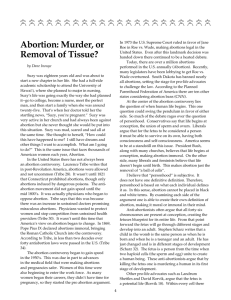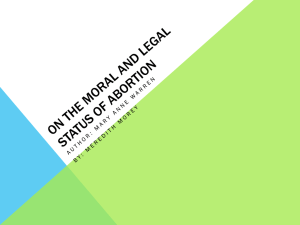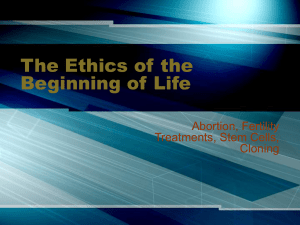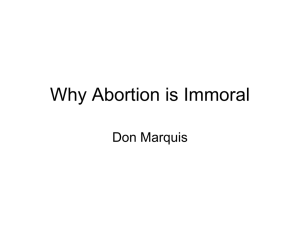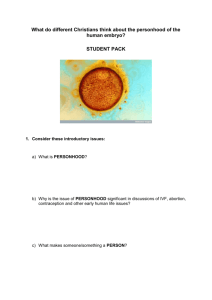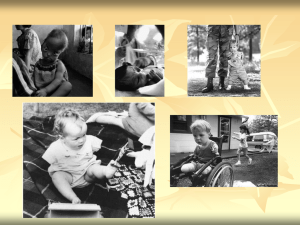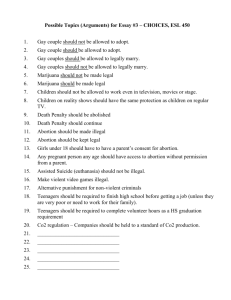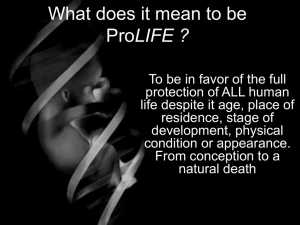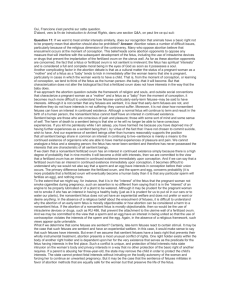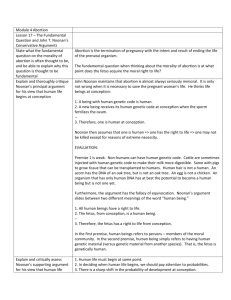abortion
advertisement
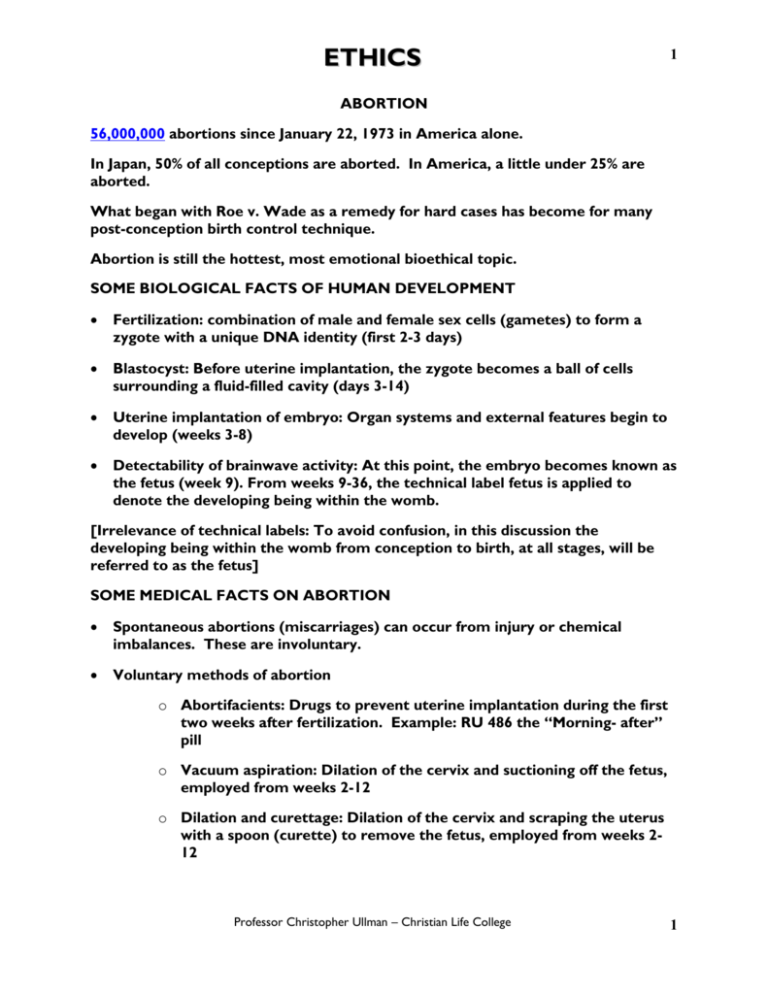
ETHICS 1 ABORTION 56,000,000 abortions since January 22, 1973 in America alone. In Japan, 50% of all conceptions are aborted. In America, a little under 25% are aborted. What began with Roe v. Wade as a remedy for hard cases has become for many post-conception birth control technique. Abortion is still the hottest, most emotional bioethical topic. SOME BIOLOGICAL FACTS OF HUMAN DEVELOPMENT Fertilization: combination of male and female sex cells (gametes) to form a zygote with a unique DNA identity (first 2-3 days) Blastocyst: Before uterine implantation, the zygote becomes a ball of cells surrounding a fluid-filled cavity (days 3-14) Uterine implantation of embryo: Organ systems and external features begin to develop (weeks 3-8) Detectability of brainwave activity: At this point, the embryo becomes known as the fetus (week 9). From weeks 9-36, the technical label fetus is applied to denote the developing being within the womb. [Irrelevance of technical labels: To avoid confusion, in this discussion the developing being within the womb from conception to birth, at all stages, will be referred to as the fetus] SOME MEDICAL FACTS ON ABORTION Spontaneous abortions (miscarriages) can occur from injury or chemical imbalances. These are involuntary. Voluntary methods of abortion o Abortifacients: Drugs to prevent uterine implantation during the first two weeks after fertilization. Example: RU 486 the “Morning- after” pill o Vacuum aspiration: Dilation of the cervix and suctioning off the fetus, employed from weeks 2-12 o Dilation and curettage: Dilation of the cervix and scraping the uterus with a spoon (curette) to remove the fetus, employed from weeks 212 Professor Christopher Ullman – Christian Life College 1 ETHICS 2 o Saline injection: Amniotic fluid around fetus is replaced by a salt water solution that is toxic to the fetus, inducing a miscarriage, employed after 12 weeks o Partial birth abortion: Fetus is pulled feet first through the vagina. Before the skull appears a tube inserted to suction out the brain. Employed up until natural birth. o Hysterotomy: Fetus is removed by surgery through an incision, similar to the Caesarean section procedure. Employed up until natural birth. THE SINGLE, CENTRAL ETHICAL QUESTION: WHO (WHAT) IS A PERSON? Your answer obligates you to certain behaviors. Why? 1. Persons are to be protected 2. Persons are not to be killed, without warrant If a fetus (from conception to birth) is a person, He/she has a claim to life Only a threat to the mother’s physical survival warrants abortion The moral burden is on the aborter(s) in each case, to demonstrate that abortion is not murder If a fetus (at any point from conception to birth) is not a person, Abortion and cyst removal are morally equivalent Removal of unwanted tissue involves no serious moral problem If a fetus (at any point from conception to birth) is merely a potential person, Warrant for abortion is needed, but is not as crucial as in the fetal personhood status The potential person may have some claim to life The question is begged, “When in the fetal development process does the potential person become an actual person?” A SECOND ETHICAL QUESTION MUST BE ADDRESSED, THOUGH IT IS OF LESSER IMPORTANCE THAN THE FIRST QUESTION. What rights does a pregnant woman have over her own body? Professor Christopher Ullman – Christian Life College 2 ETHICS 3 Pregnancy requires a woman to pay a considerable price, physically, emotionally, and socially. This price is paid both during and after the term of pregnancy. Discomfort Pain Stress Restrictions Toxemia Worry Complications Death in childbirth Career hindrances Social changes -? TECHNOLOGY NOT THAT RELEVANT Unlike other edges of life controversies (euthanasia and infanticide, for example), technology is not the driving force in the push for abortion rights. Social factors often are the most powerful influences for making a decision to abort. Concern about overpopulation Economic uncertainty Domestic instability Divorce The sexual revolution Advancement of women’s rights Career and professional goals Medical concerns for the survival or health of either the mother or the fetus also influence the decision to abort. STILL, THE FIRST ISSUE TO ADDRESS IS: Professor Christopher Ullman – Christian Life College 3 ETHICS 4 IS THE FETUS A PERSON? “Potential Personhood” If the fetus is thought to be merely a potential person, when does that potentiality become actuality? When does the potential person become an actual person? Is there a decisive moment before which the fetus is merely a potential person, and after which the fetus is an actual person? Birth? Viability? First sign perceived by the mother that she is pregnant? First perceived movement of the fetus? First detected brainwaves? Implantation? Conception? If no decisive moment can be identified, then the term “potential person” signifies an empty category, like the terms “unicorn” and “Vulcan.” GOVERNMENT ROLE Since the government has an interest in protecting the rights of persons, should the government be responsible for inventing a definition of personhood? If you accept the 1973 Supreme Court decisions of Roe v. Wade and Doe v. Bolton, your answer is “yes.” The government decided that personhood begins at birth. Prior to birth, the government has no requirement to protect the rights of the fetus, since abortion is allowed in the third trimester to protect either the physical or mental health of the mother. Hence, abortion on demand is the law of the land. WHY BE CONCERNED ABOUT FETAL PERSONHOOD? The legitimacy of laws restricting abortion = 1 uncertainty about fetal personhood The greater the uncertainty, the lesser the legitimacy. Rustling in the Thicket Analogy Wedge Analogy Professor Christopher Ullman – Christian Life College 4 ETHICS 5 FETAL DESTRUCTION HAS ECONOMIC AND SOCIAL CONSEQUENCES. At the current rate of nearly 1,000,000 abortions per year, the impact is: 1. Decreased labor pool 2. Decreased taxpayer base 3. Decrease talent pool 4. Decreased consumer base 5. Devalued view of humanity 6. -? Can 1-4 be offset by adjusting immigration quotas? If so, are Americans willing to see consensus about moral issues shift in response to an influx of persons not raised in America? SLIPPERY SLOPE If we allow abortion on demand because we are unclear on the meaning of personhood, will we allow other procedures of convenience for the same reason? Examples: Infanticide Euthanasia Genocide The slippery slope: We are on it. RIGHT TO LIFE VS. AUTONOMY The right to life of a person takes precedence over the right to autonomy of a woman or a man. Why? The right to life is a necessary condition to the right of autonomy. There is no autonomy for a corpse. The right to autonomy is not a necessary condition to the right to life. Although Patrick Henry shouted, “Give me liberty, or give me death!” it is possible to be alive and have your autonomy restricted, or even virtually non-existent. Examples: Professor Christopher Ullman – Christian Life College 5 ETHICS 6 PSYCHOLOGY AND ABORTION What are some of the negative psychological effects on women who have experienced abortion? Anxiety about the morality of the decision to abort Remorse Depression Guilt Sexual dysfunction Reduction of self-esteem Anger Grief If the belief that fetal non-personhood is so strong, why do so many abortive mothers complain of post-abortion stress syndrome, years after the abortion? PITFALLS IN THE ABORTION DEBATE Euphemisms Arbitrary distinctions Indistinct shifting definitions Ulterior motives Confusion over priorities Are we defining personhood, or are we recognizing personhood? If you knew a woman who was pregnant, who had 8 kids already, three of whom were deaf, two of whom were blind, one who was mentally retarded, and she had syphilis, Would you recommend that she have an abortion? Did you say “yes?” Professor Christopher Ullman – Christian Life College 6 ETHICS 7 Then Beethoven would not have been born. Professor Christopher Ullman – Christian Life College 7
